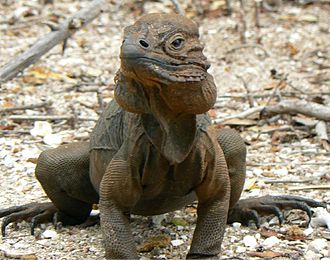Type the name of the breed you're looking for below
[wpdreams_ajaxsearchlite] Don't see the breed your're looking for? Click here and let us know!
Rhinoceros Iguana
| Place of Origin and Range | Ranging throughout Hispaniola, Haiti and the Dominican Republic; rhinoceros iguana populations are stable only on Isla Beata and the extreme of the Barahona Peninsula inside Parque Nacional Jaragua. |
| Description | Skin colours range from a steely grey to a dark green and even brown. Their name derives from the bony-plated pseudo-horn or outgrowth which resembles the horn of a rhinoceros on the iguana's snout. |
| Morph Patterns Available | Yes |
| Adult Size | Can grow up to 4 feet (120 cm) |
| Accommodation | Rhinoceros iguanas will thrive only in temperatures of 79 °F (26 °C) to 95 °F (35 °C) and must have appropriate sources of UVB and UVA lighting, or else their bodies cannot produce vitamin D that promotes calcium absorption, which can result in a metabolic bone disease that can be fatal. A large enclosure and access to fresh water. 6 f x 6 f x 30 inches. |
| Lifespan | Can live 15 - 20 years |
| Feeding / Diet | Rhinoceros Iguana is primarily herbivorous, consuming leaves, flowers, berries, and fruits from different plant species. |
| Breeding | Male rhinoceros iguanas are territorial and the most aggressive males will have the largest range of territory. Mating takes place at the beginning of, or just prior to, the first rainy season of the year (May to June) and lasts for two to three weeks. Females lay from 2 to 34 eggs, with an average clutch size of 17, within 40 days. Females guard their nests for several days after laying their eggs, and incubation lasts approximately 85 days. It has been noted that their eggs are among the largest lizard eggs produced in the world. |



